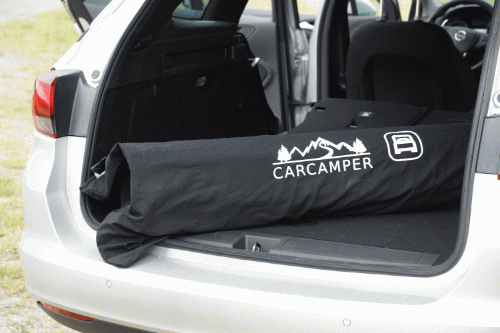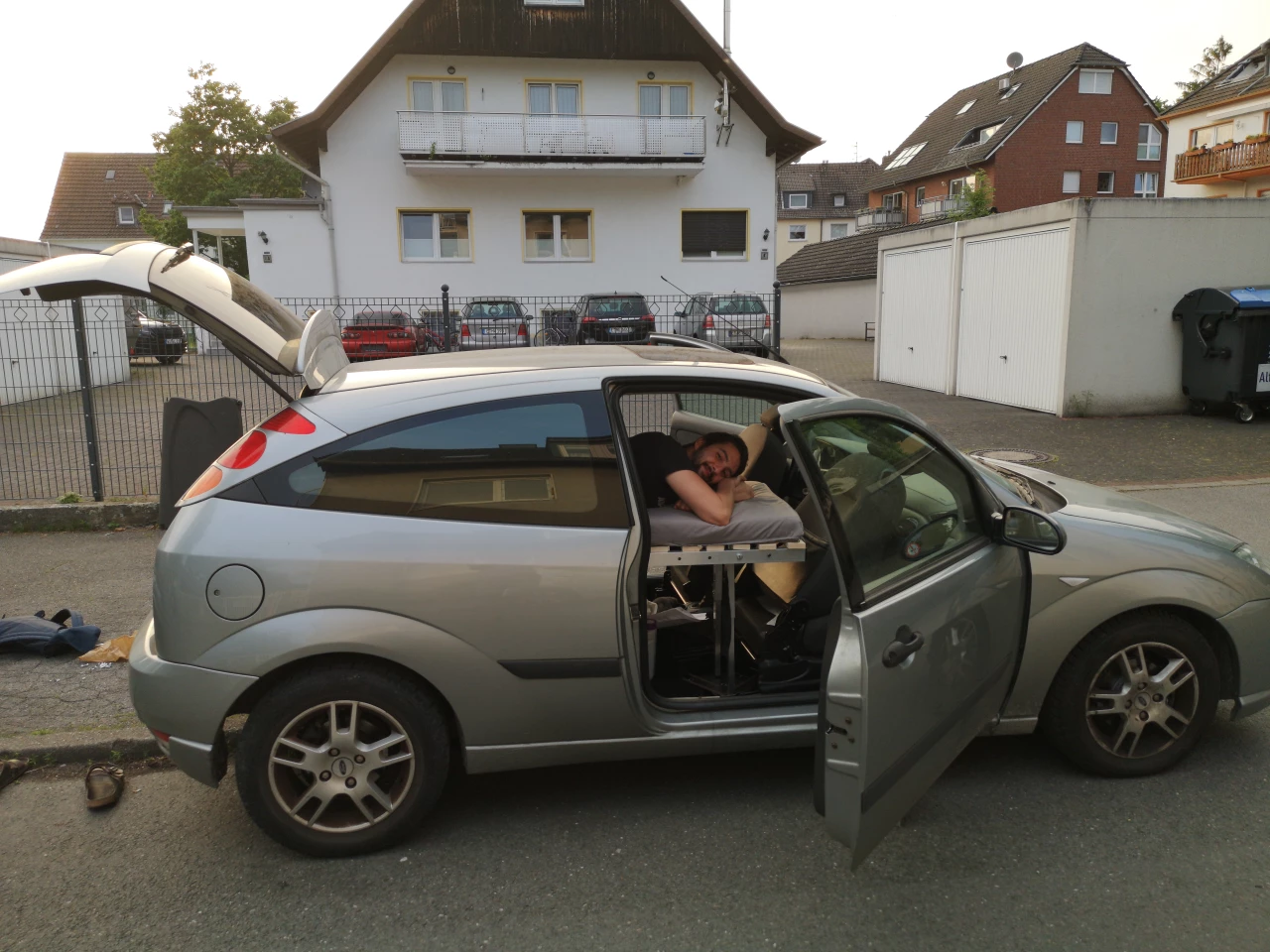In-vehicle camper-in-a-box solutions range from Swiss Army-inspired contraptions that fold, slide and twist, to rugged boxes of electricity, to Lego-like building blocks and beyond. German startup CarCamper distills in-vehicle camping down to the basics and launches a lighter, simpler, more affordable solution aimed at a wider variety of everyday commuter vehicles. More of a camper in a bag than a box, its collapsible, rollable sleeping platform transforms vehicles, from actual vans to three-door hatchbacks, into basic campers.
We'd think the camper in a box would be one of the biggest trends of 2021, seeing as how people have made camping and RVing a preferred style of travel for the new normal. While some of those travelers have the budget for glamping-grade RVs, others could very much benefit from an easy, affordable means for transforming an everyday vehicle into a temporary camper. But looking at the sea of motorhomes and camping trailers that dominate the floor of a show like the recent Düsseldorf Caravan Salon, it seems camper-in-a-box solutions remain but a tiny niche in a market favoring much more complex and expensive vehicular solutions.
One major factor holding the average camper-in-a-box kit back from more widespread popularity is that each one is designed for a specific set of vehicle models, sometimes just a single vehicle. If you have to buy a specific van, wagon or SUV just to install a camper kit, it very well might be easier to just buy a complete camper van, used or new.
By simplifying its kit down and making adjustability an integral element of its hardware, CarCamper looks to offer a more universal solution that can work with a variety of cars drivers already own.

Living in Germany's Ruhr region, CarCamper founder and avid surfer Moses Kramer found himself having to travel over 120 miles (200 km) to find waves worth riding. After renting a camper van on one trip to the Canary Islands, Kramer was hooked on the easier surfing access that came with making a temporary homestead out of a parking space along the sandy coastline. But with prices of used vans skyrocketing out of his budget, even a DIY camper van was out of reach.
Why can't I just use my own car as a mini-camper? Kramer thought. And so he did, substituting a van-size budget for his own engineering know-how to create a camper solution inside his humble Opel Astra. Somewhere along the way, he realized he had a design that could be popular with other car owners who might be interested in transforming a downtown-friendly small car into an adventurous micro-camper on weekends before easily switching back on Monday morning.

The CarCamper is essentially a mattress-top platform that stands up inside the vehicle. The platform itself adjusts in length between 4.9 and 6.5 feet (1.5 and 2 m), and the four individual legs adjust in height via a simple push-button lock system. Threaded leveling feet and tie-down straps finish the job in making the platform secure and stable enough to spend the night on. The kit does not come with the mattress, so users will have to use their own foam or inflatable sleeping pad, or add on one of the mattress options CarCamper offers separately.
Since it stands atop four legs, CarCamper's platform leaves space underneath for stashing luggage overnight. In the morning, the kit breaks down into individual aluminum frame tubes and a rolled-up slatted platform top, all of which stash conveniently in the included carry bag. That's quite a space saver versus full-width camper boxes that secure to the floor during the ride.

By making its kit smaller, lighter and less vehicle-specific than others, CarCamper should be available more universally than camper-in-a-box kits tied to specific markets (often Europe). It currently plans to ship worldwide.
CarCamper has developed single- and two-person bed platforms. The single-person version measures just under 24 in (60 cm) wide and up to 83 in (210 cm) long, supporting up to 264 lb (120 kg) of weight on top. The dual-sleeper measures 47 in (120 cm) at the head, tapering in the middle to 39 in (99 cm) as it stretches up to 79 in (200 cm) in length. It holds up to 440 lb (200 kg). Those dimensions will make for a snug, cozy night of sleep but not so much snugger than you'd get in a camper van or trailer, save for the likelihood of limited headroom (unless you're using a high vehicle like a van).
As a quick comparative example, the upper double bed in the Ahorn Camp Van Big City we covered a few days ago measured in at 48 x 78 in (121 x 198 cm), comparable to the fully extended Car Camper Duo, albeit without the leg taper and with the headroom of a pop-up van roof.

CarCamper is currently running a Kickstarter campaign aimed at getting its bed modules to market and further developing the slide-out kitchen and storage modules that are in the prototype stages (a solo camper with full kitchen inside a small three- or four-door sounds quite impressive). The Solo kit is on offer at pledge levels of €249 (approx. US$295) and up, while the Duo kit starts at €299 (US$353). That's a fraction of the price that some camper-in-a-box systems go for, even if you add on a €100 Solo or €140 Duo mattress, but the CarCamper also lacks kitchen equipment and other provisions other kits often include. The company has already surpassed its $11,805 goal with 13 days left to go. It hopes to begin shipping the first backer units around the world by November.
Despite CarCamper's claim of fitting "almost every car," there are some very real limitations to the magic any in-vehicle camper kit can work. You're not going to camp in a closed-off car trunk or squeeze a sleeping platform in the low, narrow tunnel between a three-box vehicle's trunk and folded rear seats, so you'll need some kind of a hatchback to open things up. CarCamper's vehicle fit tool is still rather rudimentary and requires actually getting out and taking measurements to see if your vehicle works, so we don't have a list of compatible vehicles. Those interested in getting a kit will want to carefully follow the vehicle-fitting instructions on CarCamper's website. The company's photos show the kit installed in three- and five-door hatchbacks, sedans, crossovers and other vehicles you'd never expect to camp in comfortably.
Source: CarCamper



















